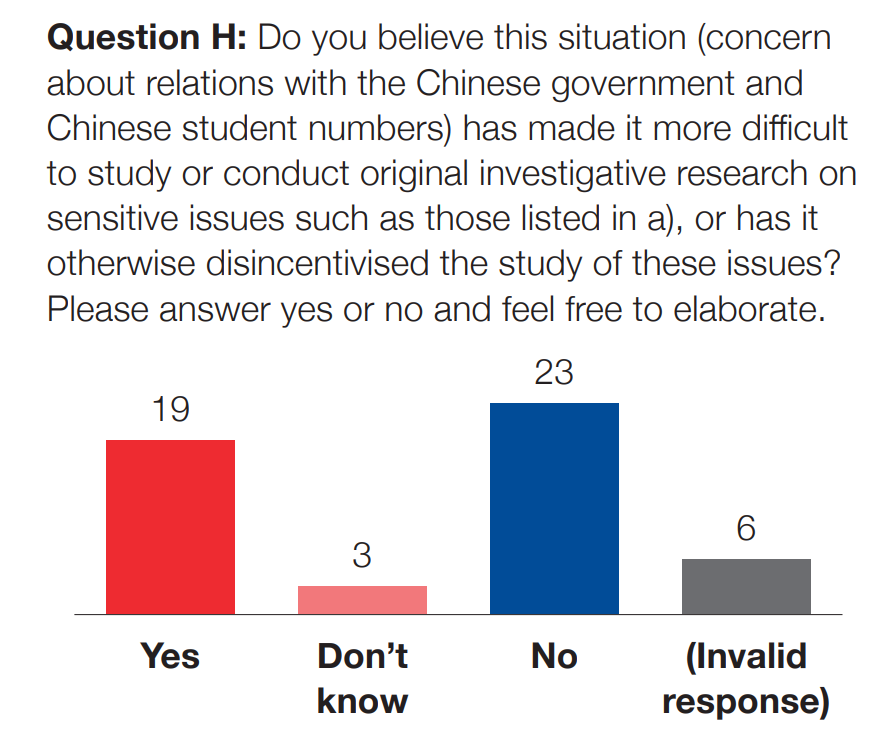UK-China Transparency has released a new report into the state of China Studies in British universities. Based upon evidence compiled from fifty responses to a broad survey of academics within the field, it paints a picture of a field in crisis. It describes widespread concerns within the academic community about spying, intimidation, harassment, and self-censorship

A sample question from the report.
Commenting on the report, Professor Gregory Lee, professor emeritus at the University of St Andrews, said:
“‘Cold Crisis’ is the most important report to have ever been produced on the issues of censorship and academic constraints surrounding China-focused and Chinese studies in the UK. While alarm bells have been ringing for several years, the extent and the depth of this problem has been largely ignored and sidelined by government and, in particular, by universities dependent for their financial viability on Chinese student fees. Economically such dependence has always been a poor strategy. How many banks would lend money to a business overly dependent on one revenue stream? All it takes is a politically motivated hiatus for such dependent universities to be hit very badly. In today’s world of trade tariff revenge, universities are even more dependent on the goodwill of China’s authorities.
“Beyond the lack of economic wisdom in the current state of affairs, is a huge oral question. If the humanities and social sciences are to do their job, then, academics must be free to conduct research in a critical manner without fear or constraint. They must also be free, and indeed encouraged, to inculcate that critical perspective in the students they teach be they PRC students or homegrown. “
“As an academic who has written on these issues, it most encouraging to see UK-China Transparency bring them into the public sphere with this report. The report does not engage in China-bashing, but rather focuses on the overt and insidious ways in which organs of the Chinese state intimidate Chinese nationals and UK nationals alike. By not taking action on such issues, we in the UK are complicit in the Chinese authorities efforts to have their own idyllic vision of China dominate the minds of students and non-students alike.
“UKCT are to be congratulate on this timely wake-up call. May it be heard loud and clear.”
Specifically, the report has found the following:
- Our China studies system is subject to widespread CCP influence, interference and harassment. These activities are a source of distortion in the field, its expert body and their output. This in turn likely has downstream effects for the knowledge supplied to government, the media, think-tanks, business, etc., although we have not investigated this in depth.
- Some expressions of these problems appear to be caused or exacerbated by financial dependence on China. In this respect the issues in China studies are a sub-crisis of the broader financial crisis in the HE sector.
- For Chinese nationals involved in China studies here (as students or as academics), it amounts to a partial replication on British campuses of the repressive dynamic within China itself.
- The situation is diverse/uneven, however, with some universities doing better than others. There is resilience, with slightly more responses saying that their university was doing enough to support full and safe engagement with topics the CCP is sensitive about than said that their universities was not doing enough.
READ THE FULL REPORT HERE.
The report is released just as recent guidance from the UK’s Office for Students (OfS) – an arms-length body of the British Government – comes into effect. In thinly veiled speech, this guidance recommends the termination (or, at the very least, substantive amendment) of Confucius Institute arrangements (example 26), and China Scholarship Council mechanisms (example 25). UKCT submitted extensive information to the OfS during its consultations on these issues.
Both developments – the report and the guidance coming into force – are related to UKCT’s broad-ranging work on CCP interference on campus. That work is described in detail here.